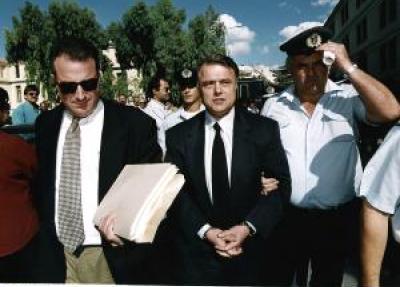www.bnr.bg
The bank stability of Bulgaria and the scandals concerning Corporate Commercial Bank occupy an important place in the Greek media this Saturday.
Bulgaria: Corporate Bank's Licence will be Suspended, this is the title of the Greek newspaper Capital. "The dramatic collapse of Corporate Commercial Bank is a reminder that in spite of the progress noticed in the euro area since the crisis, part of the European banking system is far from safe," wrote the newspaper.
The topic is being discussed by TheTOC.gr online edition. The title is: The Fourth Biggest Bulgarian Bank has Collapsed - Bank Managers will be Arrested. The edition informs that: the Bulgarian state will guarantee the accounts of all depositors. As the Minister of Finance announced, this plan will burden the state by 1.4 billion euro, a fact that will lead to a budget deficit of 3%.
The title of the economic daily Express is: Bulgaria: a Deficit of 3.5 Billion Euro in the Treasury of Corporate Bank, whereas the specialised bank electronic edition ToXrima.gr predicts: “The Bulgarian National Bank saved the Corporate Bank deposits, but uncertainty, according to various sources of information, is sending more and more Bulgarians to foreign banks in the country.” This is good news for Greece, however, as four of its reliable banks, with strong networks, retain their position in Bulgaria. Of these, the Greek National Bank with its subsidiary United Bulgarian Bank ranks second on the Bulgarian banking market. Eurobank with Postbank is in a favourable position too, as well as Piraeus and Alpha Bank.
Many Greek media draw attention to the similarities between Tsvetan Vasilev and Georgios Koskotas - the biggest synonym of corruption, ruthlessness and cynicism in recent Greek history.
 In 1979, Georgios Koskotas, during the government of Constantine Karamanlis, took over as the Director of the Currency Operations office of the Bank of Crete, although he was only 25 years old at the time. He became famous in Greece in the early 1980s. His age, giant wealth and easy-to-remember appearance made him popular even among tourists visiting the country. In 1982, Koskotas bought Grammy, a journalistic and publishing company, from Pavlos Bakoyannis, and in 1984 he bought 56% of the share capital of the Bank of Crete (later his shares reached 82%), for the sum of 1 billion drachma.
In 1979, Georgios Koskotas, during the government of Constantine Karamanlis, took over as the Director of the Currency Operations office of the Bank of Crete, although he was only 25 years old at the time. He became famous in Greece in the early 1980s. His age, giant wealth and easy-to-remember appearance made him popular even among tourists visiting the country. In 1982, Koskotas bought Grammy, a journalistic and publishing company, from Pavlos Bakoyannis, and in 1984 he bought 56% of the share capital of the Bank of Crete (later his shares reached 82%), for the sum of 1 billion drachma.
4,000 employees work in his companies. In 1986, he proceeded to the purchase of the Bank of Central Greece, but because of the reactions in the media, the government did not allow the sale. In 1987, Koskotas bought the football club of Olympiakos from ship owner Stavros Niarchos.
The then-government of PASOK was fast to strengthen their ties with the businessman who achieved success so quickly. The accounts in the Bank of Crete increased many times thanks to the money of state-owned companies (a total of 13 billion in 1988), and many senior civil servants became official associates of Koskotas. The favourable conditions provided by the bank led to a deposit increase of 76.5 billion drachma.
Koskotas turned the Grammy Publishing House into a print-publishing giant issuing a daily newspaper and 6 magazines. He bought three anti-government newspapers Vradini, Evdomi and the historical newspaper Kathimerini from Eleni Vlahou in 1986, which Koskotas later turned into PASOK proponents. At the same time, he showed interest in buying the Eleftherotypia newspaper. The widespread invasion of the latter on the media market is a key to its disorderly rise. The government saw Koskotas as a very strong publisher offering his support in exchange for the political cover-up of his activities.
It was revealed that Koskotas embezzled 33.5 billion drachma from the Bank of Crete. All this had started when he was only an employee of the bank. He used that money to purchase all his companies and bribe state officials.
Then he sold the Bank of Crete to the Arfanis-Chioni group of companies, Grammy was bought by Yannis Alafuzos, and Olympiakos - by Argyris Saliarelis. The latter helped Koskotas to escape from Greece, who first headed to Brazil and then moved to the U.S.A, where he was arrested and detained in the prison of Salem. Koskotas was released in 2001, having served three fifths of his sentence.